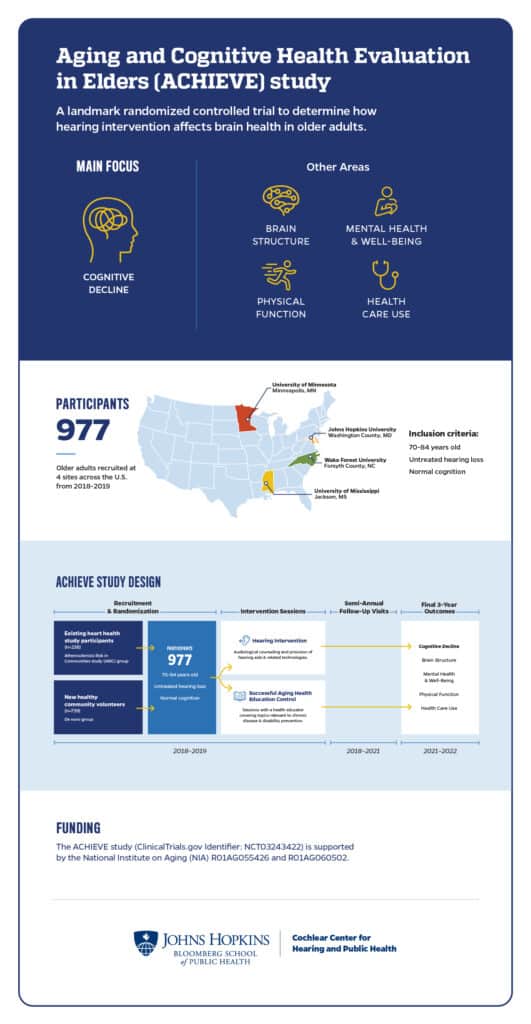The Aging and Cognitive Health Evaluation in Elders (ACHIEVE) study represents a pioneering effort aimed at unlocking a crucial question: Can treating hearing loss in older adults effectively reduce the gradual loss of thinking and memory abilities (cognitive decline) that often precede dementia?
With hearing loss affecting 1 in 8 Americans and its rates increasing among older adults, the significance of the ACHIEVE study cannot be overstated.
Hearing Loss and Dementia – Growing Public Health Issues
Hearing loss is a common health concern affecting millions of people worldwide. As our population ages, the number of people experiencing hearing loss is expected to escalate, reaching over 73 million by 2060 in the United States. Unfortunately, less than 20% of Americans with hearing loss use a hearing aid due to barriers including limited access to hearing care services and technology, poor affordability, and lack of awareness of their condition.
Simultaneously, dementia poses an unprecedented public health crisis, with an estimated 47 million people living with the condition globally in 2015. The aging population is a significant contributing factor, and this number is projected to triple by 2050. As of now, there is no definitive cure for dementia, making the identification of effective prevention strategies all the more urgent.
While the relationship between hearing loss and dementia may not be immediately apparent, a wealth of research has unveiled a significant and potentially preventable association. Recent studies have indicated that hearing loss is more than just an inconvenience or communication challenge; it is a key risk factor for cognitive decline and dementia. In fact, hearing loss has been identified as the primary risk factor, surpassing other well-known factors such as low education, high blood pressure, and smoking.
While there are several risk factors that have been linked to dementia (e.g., low education, high blood pressure, smoking), an international group of scientists convened by the Lancet Commission to examine dementia concluded that hearing loss accounted for the greatest number of potentially preventable cases of dementia. One study found that people with a mild, moderate, and severe hearing loss, respectively, had a 2x, 3x, and 5x greater risk of being diagnosed with dementia over time compared to people without hearing loss.
Researchers have delved into the underlying mechanisms that link hearing impairment and dementia. They have discovered that hearing loss can profoundly impact the brain, leading to accelerated brain aging, cognitive limitations, and even social isolation, which further contributes to the risk of dementia. People with untreated hearing loss face an elevated risk of developing cognitive decline compared to those without hearing impairment.
Promising Role of the ACHIEVE Study
 Recognizing the paramount importance of addressing hearing loss as a potential gateway to dementia prevention, the Aging & Cognitive Health Evaluation in Elders (ACHIEVE) study was initiated. Sponsored by the National Institute on Aging, the ACHIEVE study is a trailblazing multicenter randomized trial involving 977 older adults aged 70 to 84 years, all of whom suffer from untreated hearing loss.
Recognizing the paramount importance of addressing hearing loss as a potential gateway to dementia prevention, the Aging & Cognitive Health Evaluation in Elders (ACHIEVE) study was initiated. Sponsored by the National Institute on Aging, the ACHIEVE study is a trailblazing multicenter randomized trial involving 977 older adults aged 70 to 84 years, all of whom suffer from untreated hearing loss.
The primary objective of the ACHIEVE study is to answer a crucial question: Can treating hearing loss in older adults effectively reduce cognitive decline over a three-year period?
Beyond this core focus, the study also seeks to investigate the effects of hearing intervention on a myriad of other health outcomes, including cognitive impairment, dementia, brain structure and function, mental health, physical function, and healthcare utilization.
Participants in the ACHIEVE study were recruited from four research sites across the United States, ensuring a diverse and representative sample. The study design employed random assignment to two groups: one receiving hearing intervention and the other receiving health education as a control intervention.
The hearing intervention involved individualized sessions with audiologists, during which participants learned to use hearing aids and other hearing technologies to optimize their hearing and communication abilities. The health education control intervention included individual sessions with health educators covering topics relevant to chronic disease and disability prevention.
Throughout the three-year study period, participants underwent regular tests of thinking and memory to evaluate the impact of hearing loss treatment on cognitive decline. To ensure the accuracy of cognitive testing, researchers implemented rigorous procedures to address potential effects of hearing loss on the test results.
Advancing Our Understanding of Hearing and Cognitive Health
The ACHIEVE study presents a significant opportunity to advance our understanding of dementia prevention and healthcare. By investigating the potential impact of treating hearing loss on cognitive health, this research initiative holds promise for future insights.
Should the study findings establish a clear link between hearing intervention and reduced cognitive decline, it may lead to new approaches in dementia prevention. These crucial findings may empower efforts to address barriers in accessing hearing care and raise awareness about the relationship between hearing loss and dementia. Ultimately, the study has the potential to contribute to the shaping of public health policies and improved clinical practice.
Frank Lin, MD, PhD and Josef Coresh, MD, PhD (study co-principal investigators) presented the results of the ACHIEVE study at the Alzheimer’s Association International Conference in Amsterdam on July 18, 2023.
Learn more about the ACHIEVE study here
References:
- Livingston G, Huntley J, Sommerlad A, Ames D, et al. Dementia prevention, intervention, and care: 2020 report of the Lancet Commission. Lancet. 2020 Aug 8;396(10248):413-446. doi: 10.1016/S0140-6736(20)30367-6. Epub 2020 Jul 30. PMID: 32738937; PMCID: PMC7392084
- Lin FR, Metter EJ, O’Brien RJ, Resnick SM, Zonderman AB, Ferrucci L. Hearing loss and incident dementia. Arch Neurol. 2011 Feb;68(2):214-20. doi: 10.1001/archneurol.2010.362. PMID: 21320988; PMCID: PMC3277836
- Lin FR, Albert M. Hearing loss and dementia – who is listening? Aging Ment Health. 2014;18(6):671-3. doi: 10.1080/13607863.2014.915924. PMID: 24875093; PMCID: PMC4075051
Aging and Cognitive Health Evaluation in Elders (ACHIEVE) trial: https://clinicaltrials.gov/study/NCT03243422 - Goman A, Lin F. Prevalence of Hearing Loss by Severity in the United States. Am J Public Health. 2016;106(10):1820-1822. doi: 10.2105/AJPH.2016.303299. Epub 2016 Aug 23. PMID: 27552261; PMCID: PMC5024365.
- Goman AM, Reed NS, Lin FR. Addressing Estimated Hearing Loss in Adults in 2060. JAMA Otolaryngol Neck Surg. 2017;143(7):733-734. doi:10.1001/jamaoto.2016.4642
- Livingston G, Huntley J, Sommerlad A, et al. Dementia prevention, intervention, and care: 2020 report of the Lancet Commission. Lancet. 2020 Aug 8;396(10248):413-446. doi: 10.1016/S0140-6736(20)30367-6. Epub 2020 Jul 30. PMID: 32738937; PMCID: PMC7392084.
- Chien W, Lin FR. Prevalence of Hearing Aid Use Among Older Adults in the United States. Arch Intern Med. 2012;172(3):292–293. doi:10.1097/IPC.0b013e31822e9bba.
- National Academies of Sciences, Engineering, and Medicine. 2016. Hearing Health Care for Adults: Priorities for Improving Access and Affordability. Washington, DC: The National Academies Press. https://doi.org/10.17226/23446






